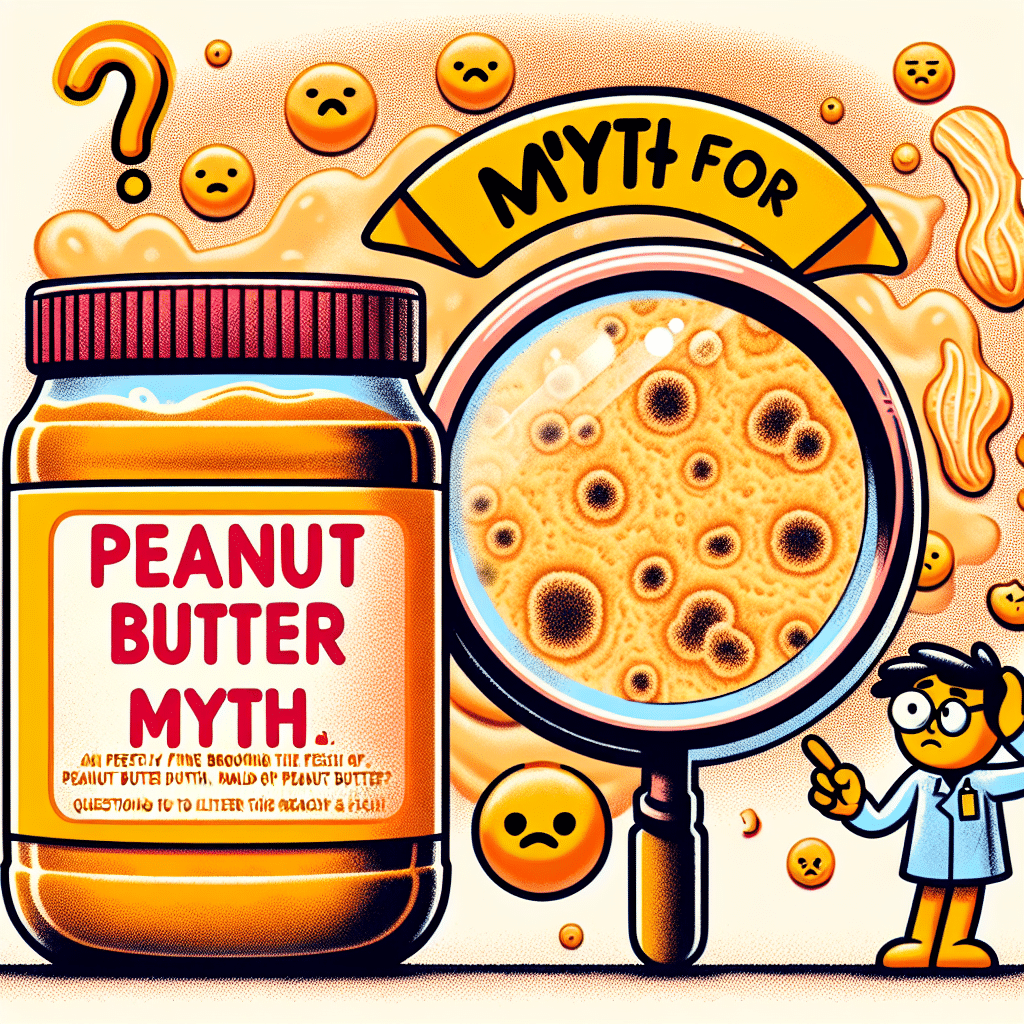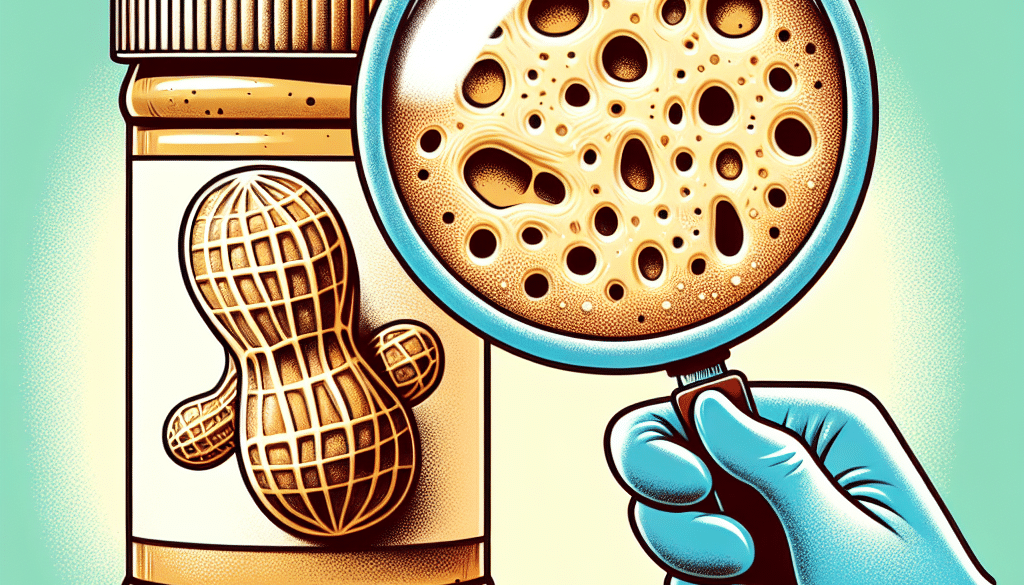Does Peanut Butter Have Mold? Unpacking The Myths
-
Table of Contents
- Does Peanut Butter Have Mold? Unpacking The Myths
- Understanding Mold in Food Products
- The Production Process of Peanut Butter
- Myths vs. Facts: Mold in Peanut Butter
- Preventing Mold in Peanut Butter
- What to Do If You Find Mold in Peanut Butter
- Case Studies and Research
- Conclusion: The Truth About Mold in Peanut Butter
- Discover ETprotein’s High-Quality Protein Products
Does Peanut Butter Have Mold? Unpacking The Myths

Peanut butter is a staple in many households, loved for its creamy texture and rich flavor. It’s a versatile food that can be spread on toast, used in recipes, or eaten straight from the jar. However, there are concerns and myths surrounding peanut butter, particularly regarding the presence of mold. This article aims to explore these concerns, debunk myths, and provide a clear understanding of the relationship between peanut butter and mold.
Understanding Mold in Food Products
Mold is a type of fungus that can grow on various foods, especially under the right conditions of warmth, moisture, and nutrients. While some molds are used beneficially in food production, such as in blue cheese, others can be harmful and produce toxins.
- Conditions for Mold Growth: Mold thrives in warm, damp environments and can grow on foods with a high water activity level.
- Types of Mold in Foods: Common molds found in food include Aspergillus, Penicillium, and Rhizopus, among others.
- Health Risks: Some molds produce mycotoxins, which can be harmful to health if ingested in large quantities.
The Production Process of Peanut Butter
The production of peanut butter involves several steps that are designed to minimize the risk of mold contamination:
- Harvesting: Peanuts are harvested and dried to reduce moisture content, which is critical in preventing mold growth.
- Roasting: Peanuts are typically roasted at high temperatures, which helps to kill any existing mold spores.
- Grinding: The roasted peanuts are then ground into a paste to make peanut butter.
- Packaging: The peanut butter is packaged in an environment that limits exposure to air and contaminants.
Myths vs. Facts: Mold in Peanut Butter
There are several myths about mold in peanut butter that need to be addressed:
- Myth: Peanut butter is a high-risk food for mold contamination.
- Fact: The low moisture content of peanut butter makes it less susceptible to mold growth compared to other foods.
- Myth: All peanut butter contains harmful mold.
- Fact: While it’s possible for peanut butter to contain mold, manufacturers follow strict guidelines to prevent contamination.
- Myth: You can’t see or taste mold in peanut butter.
- Fact: Mold can often be detected by visible changes or an off taste in the peanut butter.
Preventing Mold in Peanut Butter
There are several steps consumers can take to prevent mold from developing in peanut butter:
- Storage: Store peanut butter in a cool, dry place and keep the lid tightly closed.
- Utensil Use: Always use clean utensils to scoop out peanut butter to prevent cross-contamination.
- Shelf Life: Observe the expiration date and consume peanut butter within a reasonable time frame after opening.
What to Do If You Find Mold in Peanut Butter
If you do find mold in your peanut butter, it’s important to take the following steps:
- Discard the entire jar of peanut butter to avoid the risk of mycotoxin exposure.
- Clean the area where the peanut butter was stored to prevent the spread of mold spores.
- Consider reaching out to the manufacturer, as they may want to investigate the issue further.
Case Studies and Research
Several studies have investigated the presence of mold in peanut butter. For example, research conducted by the USDA has shown that proper roasting and processing of peanuts can effectively reduce the risk of mold contamination. Additionally, case studies where mold was found in peanut butter are often linked to improper storage or handling after the product has left the manufacturing facility.
Conclusion: The Truth About Mold in Peanut Butter
In conclusion, while it is possible for peanut butter to contain mold, the likelihood is relatively low due to the manufacturing processes and the nature of the product itself. The myths surrounding mold in peanut butter are often exaggerated, and by following proper storage and handling practices, consumers can enjoy this delicious and nutritious spread without undue concern.
Discover ETprotein’s High-Quality Protein Products
If you’re looking for a reliable source of plant-based proteins, ETprotein offers a range of products that are perfect for enhancing your diet. Their organic bulk vegan protein options, including peanut protein, are produced with the highest standards of quality and safety in mind. Whether you’re a manufacturer or a consumer, ETprotein’s products are an excellent choice for those seeking allergen-free, non-GMO protein sources.
About ETprotein:
ETprotein, a reputable protein Chinese factory manufacturer and supplier, is renowned for producing, stocking, exporting, and delivering the highest quality organic bulk vegan protein and plant proteins. They include Organic rice protein, clear rice protein, pea protein, clear pea protein, pumpkin seed protein, sunflower seed protein, mung bean protein, peanut protein etc. Their offerings, characterized by a neutral taste, non-GMO, allergen-free attributes, cater to a diverse range of industries. They serve nutraceutical, pharmaceutical, cosmeceutical, veterinary, as well as food and beverage finished product distributors, traders, and manufacturers across Europe, USA, Canada, Australia, Thailand, Japan, Korea, Brazil, and Chile, among others.
ETprotein specialization includes exporting and delivering tailor-made protein powder and finished nutritional supplements. Their extensive product range covers sectors like Food and Beverage, Sports Nutrition, Weight Management, Dietary Supplements, Health and Wellness Products, and Infant Formula, ensuring comprehensive solutions to meet all your protein needs.
As a trusted company by leading global food and beverage brands and Fortune 500 companies, ETprotein reinforces China’s reputation in the global arena. For more information or to sample their products, please contact them and email sales(at)ETprotein.com today.












